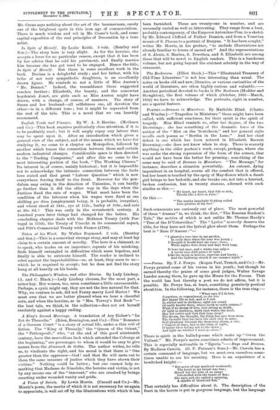The Claims of Decorative Art. Dy Walter Crane. (Lawrence and
Bullen.)—It is pleasant and comforting to meet with some one who stands up, as Mr. Walter Crane does, and makes a good fight for Art, especially Decorative Art It is a source of much bitter- ness to him that the race is to the pictorial artist, and that all artistic ability, the moment it is developed, is attracted to the profitable work of the painter. Competition and the seeking after profits has raised up the monster Commercialism, says Mr. Crane (after Mr. William Morris), and this has ruined the hopes of those who would see a healthy repercussion of Art. Certainly there is no denying the fact that Decorative Art is really in the hands of great commercial houses, and that individual effort is hopelessly swamped. The absurdity about the whole thing is, that though one would expect decoration to have knuckled under completely to the useful, it has become so rampant that much furniture is made far too ornamental to be of any use. Much splendid enthusiasm is wasted on these absurdi- ties, an enthusiasm Mr. Crane underrates, and despises when he does notice it. He is very severe about the combina- tion of the " Drawing-room and the Kitchen," and we quite agree with him. Indeed, no part of his discourse is so valuable as the attacks he makes on anachronisms and similar absurdities. He has a backhander for the Royal Academy, of course, and declares that every movement in art has grown up outside it. This is a truism, the natural tendency of all corpora- tions being to resist innovation. Still, such a body can recognise improvements; but this, of course, the body in question has ever refused to do. We have, indeed, got tired of laughing at its thoroughgoing conservatism. Under the circumstances, Mr. Crane's only hope is Socialism or the abolition of "Class." There would, indeed, be scope, if some of the theories of Socialists as to communal dwellings could ever be carried out, for the decorative artist; but does Mr. Crane believe in his heart of hearts that Art would expand under Socialism ? The greatest of all periods in Italy, when every branch of Art flourished in perfection, was in feudal times, when class-distinctions were laws almost, and when life in the cities was one continual faction-fight. And who gave the greatest support to those artists ? Art, be it remarked, would have to be independent of all Socialistic restrictions and jealousies.
Mr. Crane says nothing about the art of the hammerman, surely one of the brightest spots in this iron age of commercialism. There is much wisdom and wit in Mr. Crane's book, and some capital exposition of the real principles of Decoration by a true artist.



















































 Previous page
Previous page